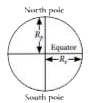The bulging of the earth at the equator and flattening at the poles is due to
centripetal force
centrifugal force
gravitational force
electrostatic force
The correct Answer is:b
Step by step video, text & image solution for The bulging of the earth at the equator and flattening at the poles is due to by Physics experts to help you in doubts & scoring excellent marks in Class 12 exams.
Updated on:21/07/2023Topper's Solved these Questions
Similar Questions
The bulging of the earth at the equator and flattening at the poles is due to
View SolutionAssuming that the whole variation of the weight of a body with its position on the surface of the earth is due to its rotation , find the difference in the weight of 5 kg as measured at the equator and at the poles . Radius of the earth = 6.4×106 m.
View Solution
Knowledge Check
The bulging of the earth at the equator and flattening at the poles is due to
Acentripetal forceBcentrifugal forceCgravitational forceDelectrostatic forceIf earth were to rotate on its own axis such that the weight of a person at the equator becomes half the weight at the poles, then its time period of rotation is (g = acceleration due to gravity near the poles and R is the radius of earth) (Ignore equatorial bulge)
A2π√2RgB2π√R2gC2π√R3gD2π√RgLet ω be the angular velocity of the earth's rotation about its axis. Assume that the acceleration due to gravity on the earth's surface has the same value at the equator and the poles. An object weighed by a spring balance gives the same reading at the equator as at a height h above the poles (h<<R). The value of h is
Aω2R2/gBω2R2/2gC2ω2R2/gD√Rg/ω
The winds generated due to uneven heating on earth between the equator and the poles are not in the exact north-south direction due to the _____ of the earth.
View SolutionEarth is flattened at the poles and budges at the eqator. This is due to the fact that
View SolutionThe Earth is not a perfect sphere. Due to the flattening of Earth at the poles, the radius of Earth is minimum at the poles and hence the value of g is maximum at the poles. One the other hand, the radius of the Earth is maximum at the equator of the Earth. As the mass and radius of moon are smaller than that of the Earth, so the value of g on moon is 1.63m/s2 . As we go up from the surface of the Earth, the distance from the centre of the Earth increases and hence the value of g decreases. The value of g decreases as we go down inside the Earth and it become zero at the centre of the Earth .

If the radius of the Earth were to shrink by 1% and its mass remaining the same, the acceleration due to gravity on the Earth's surface would
View SolutionThe Earth is not a perfect sphere. Due to the flattening of Earth at the poles, the radius of Earth is minimum at the poles and hence the value of g is maximum at the poles. One the other hand, the radius of the Earth is maximum at the equator of the Earth. As the mass and radius of moon are smaller than that of the Earth, so the value of g on moon is 1.63m/s2 . As we go up from the surface of the Earth, the distance from the centre of the Earth increases and hence the value of g decreases. The value of g decreases as we go down inside the Earth and it become zero at the centre of the Earth .

What is the value of acceleration due to gravity on the surface of Earth ?
View SolutionThe Earth is not a perfect sphere. Due to the flattening of Earth at the poles, the radius of Earth is minimum at the poles and hence the value of g is maximum at the poles. One the other hand, the radius of the Earth is maximum at the equator of the Earth. As the mass and radius of moon are smaller than that of the Earth, so the value of g on moon is 1.63m/s2 . As we go up from the surface of the Earth, the distance from the centre of the Earth increases and hence the value of g decreases. The value of g decreases as we go down inside the Earth and it become zero at the centre of the Earth .

The ratio of acceleration due to gravity ont he Moon and that on the Earth is
View Solution
